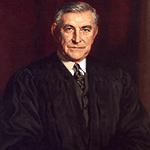
Owen Roberts (1930-1945)
Lived from 1875 to 1955.
Early Years
Owen Roberts was born in Philadelphia, Pennsylvania on May 2, 1875. After receiving his bachelor’s degree from the University of Pennsylvania, Roberts went on to attend the University of Pennsylvania Law School, where he graduated at the top of his class in 1898.
Legal Career
After law school, Roberts served as the first assistant district attorney of Philadelphia, a position he held for three years. Roberts then went on to private practice, founding the firm known today as Montgomery, McCracken, Walker & Rhoads, LLP. There, he established a nationally recognized reputation as a gifted trial lawyer. Embodying his academic and studious approach to law, Roberts also held a part time position as a professor at his alma mater for over twenty years.
Appointment to the Supreme Court
At the age of 55, Roberts was appointed to the Supreme Court by President Herbert Hoover and confirmed by the Senate on June 2, 1930. On the highest court in the land, Roberts was often a swing vote. One of the most notable cases in which Roberts’ position was decisive was West Coast Hotel v. Parish in 1937. In West Coast Hotel, Roberts voted to uphold the constitutionality of minimum wage laws, switching his position on the constitutionality of the New Deal. Roberts also authored the majority opinion in New Negro Alliance v. Sanitary Grocery Co., which safeguarded the right to boycott. Later, in Korematsu v. United States, the Court upheld an Executive Order ordering Japanese Americans into internment camps during World War II. Roberts, one of three dissenters, recognized that the defendant was being punished based solely upon his ancestry.
Later Years and Death
Roberts retired from the court in 1945, later serving as the Dean of the University of Pennsylvania Law school from 1948 to 1951. He died in Chester County, Pennsylvania on May 17, 1955 after a four-month illness.







